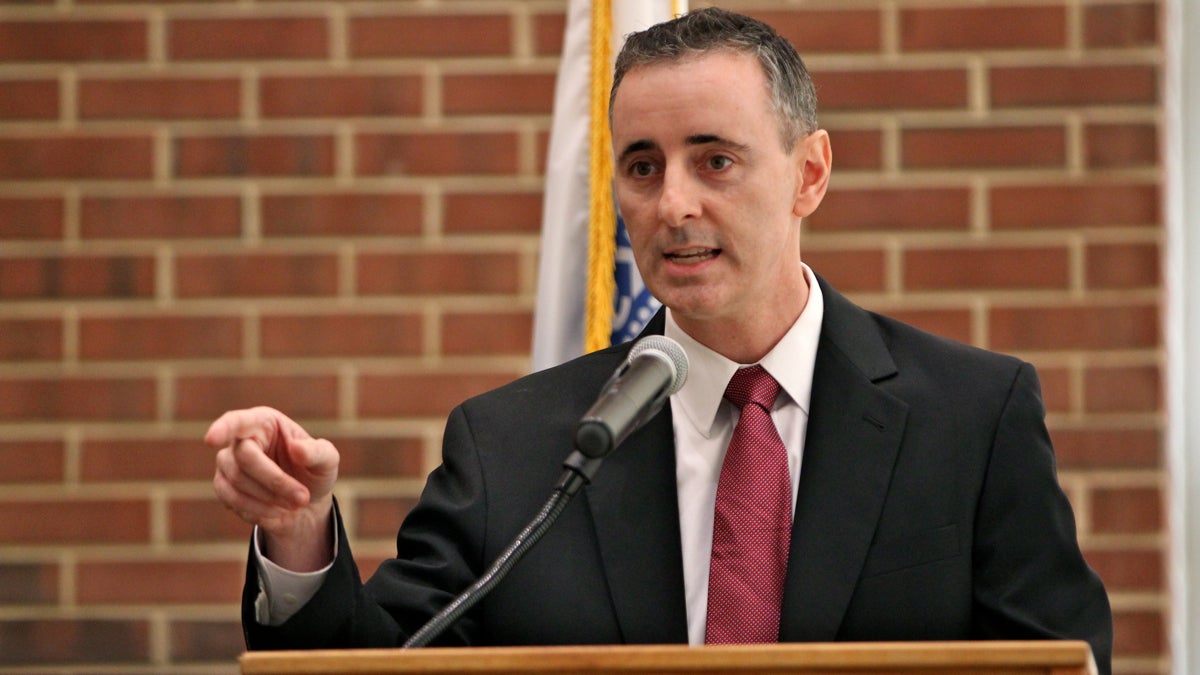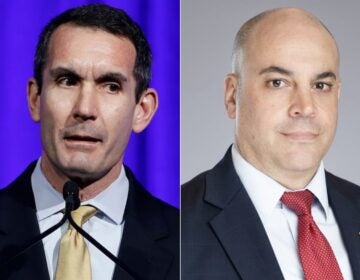In Congress, heroin task force has ambitious plans for 2018
This year the task force is adding eight bills to its agenda.
Listen 4:23
Like several of his GOP colleagues in Congress, U.S. Rep. Brian Fitzpatrick, R-Bucks, is trying to maintain some distance from President Donald Trump. (Emma Lee/WHYY)
More than 60,000 Americans are dying every year from drug overdoses, fueled by heroin, fentanyl, and prescription pain pill abuse.
That isn’t just a statistic to U.S. Rep. Donald Norcross, a South Jersey Democrat.
“I just buried a friend of mine in the past month. It touches each and every one of us, and we can’t ignore it,” Norcross said of the escalating opioid epidemic.
To that end, the congressional bipartisan Heroin Task Force is supporting a measure that would increase coordination between federal health experts and medical schools in an effort to increase training for medical students on opioids.
“This isn’t about shoving mandates. It’s about bringing those medical schools together and having that discussion that addresses the educational issue,” said Norcross, a co-chairman of the task force that’s already endorsed nine bills with two becoming law.
It’s time for lawmakers to truly combat the crisis, said U.S. Rep. Tom MacArthur, a Republican from South Jersey and another co-chair of the task force.
“It’s like a Vietnam War every year — every year — to be losing this many people,” he said. “And this is a crisis ultimately that is a personal tragedy and a family tragedy multiplied by the thousands and by the tens of thousands.”
The task force, which now has 100 members, has added eight bills to its agenda. That includes legislation that would encourage doctors to prescribe fewer opioid pills and force all Medicare Part D prescriptions to be administered electronically so patients can’t get them filled at multiple pharmacies.
In the face of the accelerating death toll, MacArthur said the task force is playing an important role.
“The role of this task force … is to bring focus, to educate our members, and to advocate for a limited number of bills that can actually move through this Congress and get funded so that we can do our part to address this crisis,” he said.
President Donald Trump has been criticized for declaring a public health emergency, but not working with Congress to provide more funding. MacArthur and the others on the task force agree that it’s essential to commit more to the effort.
“Because all of these initiatives go nowhere if they’re not adequately funded — funding and accountability,” he said.
On Wednesday Trump did sign the Interdict Act, a bill sponsored by U.S. Rep. Brian Fitzpatrick, R-Bucks, that authorizes funding for more Customs and Border Protection agents and screening equipment to stop the flow of illicit fentanyl shipments. The drug is 50 to 100 times more potent than heroin; according to the Centers for Disease Control and Prevention, authorities indicate that much of the synthetic opioid overdose increase may be due to illegally or illicitly made fentanyl.
Fitzpatrick, who’s in his first term, said the epidemic has far-reaching effects.
“The life expectancy of citizens of the United States has gone down, due in large part to the drug epidemic. There are 6 million-plus unfilled jobs in this country, due in large part to the inability to pass a drug test,” he said. “The pervasiveness of this problem is very, very broad.”
The U.S. will save money if lawmakers spend the necessary money up front to combat the crisis, Fitzpatrick said.
“Funding is important for two reasons. It saves lives, and it also saves money. For every dollar that we invest in treatment and prevention and education, we save exponentially more in the criminal justice system and even more in the health care system,” he said. “So this is one of those no-brainer issues. We need an all-hands-on-deck approach to it.”
Despite Congress being mired in gridlock and upcoming elections, U.S. Rep. Ryan Costello said the task force may have a good chance of getting its agenda passed.
“In this legislative calendar year, everyone is going to be looking — particularly Republican leadership is going to be looking — for weeks where we can do bipartisan … ‘middle America-type’ concerns,” said Costello, who represents several counties west of Philadelphia.
“I mean it’s an epidemic, every district faces it,” Costello said of the opioid crisis.
The task force next will attempt to get funds for combating the crisis added to the next bill to keep the government open. That legislation must pass later this month.
WHYY is your source for fact-based, in-depth journalism and information. As a nonprofit organization, we rely on financial support from readers like you. Please give today.




